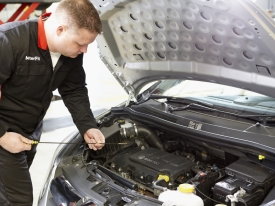
Preparation is key
There are obvious benefits to preparing your fleet and incorporating daily vehicle checks, regular servicing and repair into the overall maintenance plan which will help to ensure prevention before cure. By building a relationship with your suppliers, in many cases you may be able to schedule maintenance out of hours with limited effect on vehicle and driver downtime.
As well as integrating regular vehicle checks, driver training can also go a long way to employing efficient drivers, saving on fuel costs, ware and tear and also reducing the probability of accidents occurring through adopting safer driving techniques. Use of telematics and speed limiters can also help to manage driving techniques of your fleet to ensure safer and more efficient driving, leading to fuel savings, safety improvements and reduced accidents.
Prevention of theft is just as important in safeguarding vehicle downtime. This will include the adoption of security alarms and immobilisers, as well as parking vehicles in a safe area whilst not in use.

Choice of vehicle
Although the choice of purchasing newer vehicles may be costly, there are also potential long-term cost savings due to reduced maintenance and repair. Warranty is included as standard, so should the worst happen, at least costs will be managed. Newer vehicles are also more likely to have parts readily available, saving valuable time in crisis.
It is probably also wise to choose a model of vehicle that is easier and cheaper to repair. Whilst manufacturers are reluctant to pass on this information, many insurers are starting to reveal this information to prospective buyers. Mass-market brands are generally recommended in this case, with parts being readily available and cheaper to repair.
Reducing costs of repairs
Mobile repairs: In a bid to meet rising demands on personal service and saving time, more and more suppliers are offering mobile repairs which can be made at home or to the office. Therefore reducing the time required to deliver and fit in to a repair centre, not to mention additional cost of a courtesy vehicle. Businesses can also benefit from being able to continue to work on other tasks whilst the car is repaired at their convenience.
A centrally-managed body shop: A centrally-managed body shop will work with a reliable network of approved and audited repair centres. This will give your business the peace of mind that quality work is being carried out with reduced costs arising from centrally negotiated parts, estimates and standardised labour rates. Off-road time is reduced as vehicles are distributed to the local repair centre swiftly and progress will be chased on your behalf. In some cases businesses will have a preference on manufacturer-approved body shops so as not to invalidate warranty which will always need to be considered, or recommendations can be made should the client have no preference.
Gathering information at the scene: When your drivers are involved in a collision it is important that they gather as much information as possible at the scene to make the fleet insurance claim as straightforward as possible. Fleet Manager’s should also report the incident to their insurance broker immediately to reduce the time taken to review driver fault and claims resulting from this as well as vehicle repair. Time is money and to focus on minimising any downtime you will need to get things moving as quickly as possible. A specialist insurance broker, such as Bluedrop Services, can help to push this through with a dedicated team to follow up third party claims.
Ensuring business can run as usual
When your business does suffer from unplanned downtime it is important to have a timely replacement vehicle in place to get your fleet back on the road as soon as possible with minimal disruption. Courtesy vehicles provide invaluable reassurance and a solution to unavoidable downtime. By insuring your fleet vehicles with a courtesy vehicle incorporated into the policy you can ensure that business can still be completed in spite of unexpected downtime.
Written by Mark McKenna
Mark is a commercial insurance specialist. Starting work in the insurance profession in 1985 he has over 30 years’ experience in all areas of commercial insurance. As National Sales Manager for Bluedrop Services. Mark currently specialises in Motor Fleet Insurance and offers advice and support to customers in this area.






